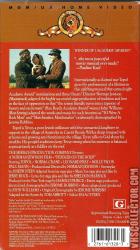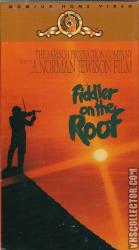Fiddler on the Roof
Catalog Number
M201320
-
Primary Distributor (If not listed, select "OTHER")
Catalog Number
M201320
Primary Distributor (If not listed, select "OTHER")
Distributor Series
Release Year
Country
N/A (NTSC)
N/A | N/A | N/A
N/A | N/A
Fiddler on the Roof (1971)
Additional Information
Additional Information
"Fiddler on the Roof" on the screen
Shout It From The Rooftops!
To Life!
Norman Jewison's adaptation of the long-running Broadway musical is set in the Ukranian ghetto village of Anatevka (the film was actually lensed in Yugoslavia). Israeli actor Topol repeats his London stage role as Tevye the milkman, whose equilibrium is constantly being challenged by his poverty, the prejudicial attitudes of non-Jews, and the romantic entanglements of his five daughters. Whenever the weight of the world becomes too much for him, Tevye carries on lengthy conversations with God, who does not answer but is at least more willing to listen than the milkman's remonstrative wife Golde. After arranging a marriage between his oldest daughter Tzeitel and wealthy butcher Lazar Wolf, Tevye is forced to do some quick rearranging when the girl falls in love with poor tailor Motel Kamzoil. Fancying himself more broad-minded than his gentile oppressors, Tevye cannot accept the notion that his other daughter Chava would want to marry Fyedka, a non-Jew. And after shouting the praises of "tradition," Tevye must change his tune-and his entire life-when he and his neighbors are forced out of Anatevka by the Czar's minions. Topol's co-stars include Norma Crane as Golde, Yiddish theater legend Molly Picon as Yente the matchmaker, and Leonard Frey as Motel.
Fiddler on the Roof is a 1971 American musical comedy-drama film produced and directed by Norman Jewison. It is an adaptation of the 1964 Broadway musical of the same name, with music composed by Jerry Bock, lyrics by Sheldon Harnick, and screenplay by Joseph Stein. The film won three Academy Awards, including one for arranger-conductor John Williams. It was nominated for several more, including Best Picture, Best Actor for Chaim Topol as Tevye, and Best Supporting Actor for Leonard Frey, who played Motel Kamzoil the Tailor (both had originally acted in the musical; Topol as Tevye in the London production and Frey in a minor part as Mendel, the rabbi's son). The decision to cast Topol, instead of Zero Mostel, as Tevye was a somewhat controversial one, as the role had originated with Mostel and he had made it famous. Years later, Jewison explained that he felt Mostel's larger-than-life personality, while fine on stage, would cause film audiences to see him (i.e., Zero Mostel the actor) rather than the character of Tevye.
The film centers on the family of Tevye, a Jewish family living in the town of Anatevka, in Tsarist Russia, in 1905. Anatevka is broken into two sections: a small Orthodox Jewish section; and a larger Russian Orthodox Christian section. Tevye notes that, "We don't bother them, and so far, they don't bother us." Throughout the film, Tevye breaks the fourth wall by talking at times, directly to the audience or to the heavens (to God), for the audience's benefit. Much of the story is also told in musical form.
Tevye is not wealthy, despite working hard, like most Jews in Anatevka, and also due to having many children. He and his wife, Golde, have five daughters and cannot afford to give them much in the way of dowries. According to their tradition, they have to rely on the village matchmaker, Yente, to find them husbands. Life in the little town of Anatevka is very hard and Tevye speaks not only of the difficulties of being poor but also of the Jewish community's constant fear of harassment from their non-Jewish neighbors. In addition, Tevye has a lame horse, that adds to the misery of being poor, and has to pull the wagon by himself.
Roadshow presentation[edit]
Because the film follows the play so closely, and the play did not have an overture, the filmmakers chose to eliminate the customary film overture played before the beginning of most motion pictures shown in a roadshow-style presentation. However, there is an intermission featuring entr'acte music, and exit music is played at the end after the closing credits.
Reception[edit]
The film was a big hit earning United Artists profits of $6.1 million plus distribution profits of $8 million.[3]
Awards[edit]
The film won three Academy Awards in 1972 and two Golden Globes in 1971.[4] It won Academy Awards for Best Song Score Adaptation, Best Cinematography, and Best Sound (Gordon McCallum, David Hildyard).[5]
It also won the Golden Globe for Golden Globe Award for Best Motion Picture - Musical or Comedy and Golden Globe Award for Best Actor – Motion Picture Musical or Comedy for Topol's acting.
Release Date: November 2, 1971
Distrib: United Artists
Boxoffice: $80,500,000 2013: $392,742,424
Shout It From The Rooftops!
To Life!
Norman Jewison's adaptation of the long-running Broadway musical is set in the Ukranian ghetto village of Anatevka (the film was actually lensed in Yugoslavia). Israeli actor Topol repeats his London stage role as Tevye the milkman, whose equilibrium is constantly being challenged by his poverty, the prejudicial attitudes of non-Jews, and the romantic entanglements of his five daughters. Whenever the weight of the world becomes too much for him, Tevye carries on lengthy conversations with God, who does not answer but is at least more willing to listen than the milkman's remonstrative wife Golde. After arranging a marriage between his oldest daughter Tzeitel and wealthy butcher Lazar Wolf, Tevye is forced to do some quick rearranging when the girl falls in love with poor tailor Motel Kamzoil. Fancying himself more broad-minded than his gentile oppressors, Tevye cannot accept the notion that his other daughter Chava would want to marry Fyedka, a non-Jew. And after shouting the praises of "tradition," Tevye must change his tune-and his entire life-when he and his neighbors are forced out of Anatevka by the Czar's minions. Topol's co-stars include Norma Crane as Golde, Yiddish theater legend Molly Picon as Yente the matchmaker, and Leonard Frey as Motel.
Fiddler on the Roof is a 1971 American musical comedy-drama film produced and directed by Norman Jewison. It is an adaptation of the 1964 Broadway musical of the same name, with music composed by Jerry Bock, lyrics by Sheldon Harnick, and screenplay by Joseph Stein. The film won three Academy Awards, including one for arranger-conductor John Williams. It was nominated for several more, including Best Picture, Best Actor for Chaim Topol as Tevye, and Best Supporting Actor for Leonard Frey, who played Motel Kamzoil the Tailor (both had originally acted in the musical; Topol as Tevye in the London production and Frey in a minor part as Mendel, the rabbi's son). The decision to cast Topol, instead of Zero Mostel, as Tevye was a somewhat controversial one, as the role had originated with Mostel and he had made it famous. Years later, Jewison explained that he felt Mostel's larger-than-life personality, while fine on stage, would cause film audiences to see him (i.e., Zero Mostel the actor) rather than the character of Tevye.
The film centers on the family of Tevye, a Jewish family living in the town of Anatevka, in Tsarist Russia, in 1905. Anatevka is broken into two sections: a small Orthodox Jewish section; and a larger Russian Orthodox Christian section. Tevye notes that, "We don't bother them, and so far, they don't bother us." Throughout the film, Tevye breaks the fourth wall by talking at times, directly to the audience or to the heavens (to God), for the audience's benefit. Much of the story is also told in musical form.
Tevye is not wealthy, despite working hard, like most Jews in Anatevka, and also due to having many children. He and his wife, Golde, have five daughters and cannot afford to give them much in the way of dowries. According to their tradition, they have to rely on the village matchmaker, Yente, to find them husbands. Life in the little town of Anatevka is very hard and Tevye speaks not only of the difficulties of being poor but also of the Jewish community's constant fear of harassment from their non-Jewish neighbors. In addition, Tevye has a lame horse, that adds to the misery of being poor, and has to pull the wagon by himself.
Roadshow presentation[edit]
Because the film follows the play so closely, and the play did not have an overture, the filmmakers chose to eliminate the customary film overture played before the beginning of most motion pictures shown in a roadshow-style presentation. However, there is an intermission featuring entr'acte music, and exit music is played at the end after the closing credits.
Reception[edit]
The film was a big hit earning United Artists profits of $6.1 million plus distribution profits of $8 million.[3]
Awards[edit]
The film won three Academy Awards in 1972 and two Golden Globes in 1971.[4] It won Academy Awards for Best Song Score Adaptation, Best Cinematography, and Best Sound (Gordon McCallum, David Hildyard).[5]
It also won the Golden Globe for Golden Globe Award for Best Motion Picture - Musical or Comedy and Golden Globe Award for Best Actor – Motion Picture Musical or Comedy for Topol's acting.
Release Date: November 2, 1971
Distrib: United Artists
Boxoffice: $80,500,000 2013: $392,742,424
Related Links







Comments0
Login / Register to post comments